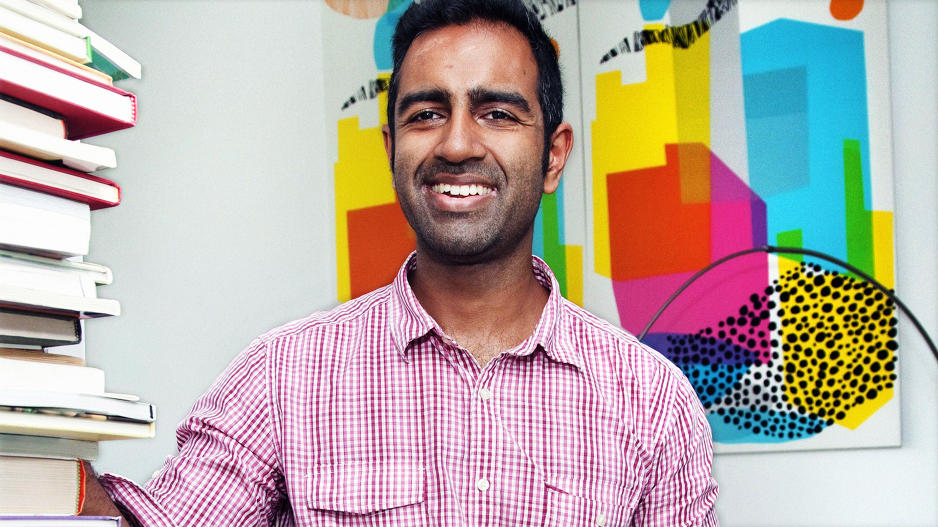How This CEO Manages Three Companies And His Very Limited Time
Amol Sarva does many things at once because he has to.
The cofounder of Virgin Mobile USA and Halo Neuroscience, Sarva currently runs three businesses, give or take. He’s the founder of Knotable, a web-based dashboard for managing and coordinating work. Meanwhile, Sarva is growing Halo, a brain-stimulation company that claims to improve performance, and a coworking-space business, Knotel, which seems to double its headcount every time you blink.
After reading that, you might not blink to learn that, when he gets up each morning, Sarva boils a pot of pungent Himalayan herbs and lets it cool while he meditates for exactly 46 minutes, then swims 30 laps before recovering in a stand-up cryotherapy pod that supercools his muscles—and clears his mind—at negative 105 degrees Fahrenheit.
But Sarva doesn’t do any of that. He just drinks black coffee and has a really smart time-management philosophy.
Sarva’s unorthodox strategy for managing his time and others’, meetings with colleagues, his companies’ shifting priorities, and how those determine what steps need to be taken when, all rests on a handful of guiding principles. As he explains it, they’re the foundation that allows him to work effectively on so many things at once, while leaving room for the serendipity that many of us cut out in the pursuit of focus. Here’s a look at three of them.
1. Divide Your Alone Time From Time Spent With Others
Sarva believes that good time-management starts with defending his own—sometimes selfishly. “Your time is the most valuable thing,” he tells me. As a boss, he says, you need to remember that before you decide how and whether to spend it.
First, he blocks out time for solo work when and where there’s nobody else around. These are periods (and physical spaces) Sarva keeps sacrosanct—they’re for important work he can’t delegate. “Try to do your head-down work from somewhere where people can’t find you,” he advises. “If you’ve blocked out time for other people, then you should be able to disappear like this without a problem.”
Then, in what may be an inversion of typical priorities, Sarva schedules space for unstructured social time, so the people he works with know he’s around and available for them, often while he’s “sitting at the bar, at the front of the office. “No one really needs to know that schedule,” he says, “but you need office hours.”
Third, he suggests, publicize what you’re up to and thinking, so people can come to you with ideas rather than having to always seek input individually. “There’s so many people who bottle up all of their progress, their problems, their questions, their ideas—and it’s not needed.” Sarva suggests a newsletter or some type of social media broadcast (Hootsuite CEO Ryan Holmes recently started using video for this purpose); it works as well for employees as it does outsiders, he says.
2. Meet Only When You Need To
Sarva only meets with other people when it serves one of three functions:
1. Solving a problem together. Interchange leads to problem-solving, Sarva explains. This works best in small groups or in one-on-one meetings. Big group meetings don’t accomplish this well, he believes.
2. Marking a deadline. The meeting is the event by which time something needs to be done. “They create the social burden of like, ‘We’re all here for the meeting. Where’s the output?’”
3. Socializing. Sometimes you just need to hang with your people, Sarva says. His favorite format for this type of meeting is simply walking around and talking to his employees during the workday—it’s not a get-in-a-room-together-at-a-specific-time sort of thing. “You’re not overcommitting time on a specific agenda item,” Sarva explains. “Just show up and get a feel for what’s going on.” That counts in his mind as a “meeting,” too—and it’s often more effective than most.
On the other hand, Sarva cautions against using meetings for the following functions, which you can do electronically and remotely instead:
- Information dissemination
- Coordination of tasks
- Analysis
3. Keep Your Priorities In Full View—And Don’t Hesitate To Share Them
Managing time and managing priorities aren’t two totally separate affairs, but they’re not identical, either. To keep his priorities in order while he goes about apportioning time, Sarva has a few tricks.
First, he makes “now and later” lists inspired by David Allen’s methodology, which helps Sarva decide what needs tackling now and what can wait. “Now” doesn’t always mean “first thing in the morning,” though. Sarva tends to schedule solo-work blocks for important (but not necessarily urgent) tasks in the mornings, before the randomness of the day can butt in. Top priorities aren’t always the most pressing, and vice versa.
When it comes to prioritizing, though, Sarva shoots for specifics with an emphasis on action. If you write out specifically how to do things, he believes, you can trust others to take them on without you being there. After all, what good are your priorities as a leader if you can’t be sure your teams share them? “Processes allow delegation,” Sarva adds.
Sarva breaks down big projects and tasks into “cards,” or components that you can look at visually and solve in concrete steps. In fact, this may be his biggest productivity secret. It’s the premise for Knotable, an app that’s designed to help people take better notes, keep them organized, and use them collaboratively.
Sarva points out that the proverbial journey of 1,000 miles begins with a single step, but as a manager he knows it’s his job to see all of the steps ahead—or at least as many as he can. Sarva’s intent behind Knotable is to create a “manager’s dashboard” offering a bird’s eye view of all of his projects. It’s sort of a “meta-” project manager that adds strategic planning on top of typical to-do apps that tends to be more atomic and structured than what Sarva thinks managers really need, which is to see—and arrange—the whole picture at once.
That’s never any easy job, Sarva knows, but it’s a manageable one.
Fast Company , Read Full Story
(25)














